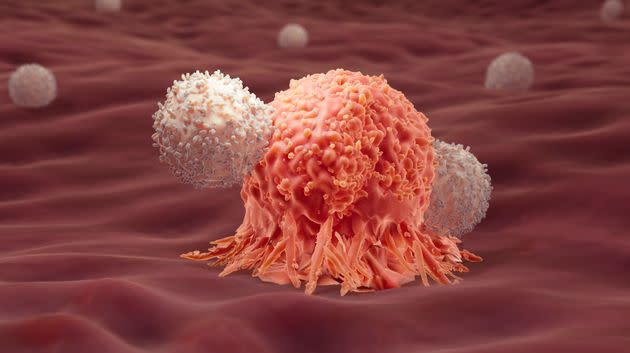A Study Suggesting Cancer Rates Among Under-50s Have Risen Might Not Be As Straightforward As It Sounds

A recent British Medical Journal (BMJ) study has shared that cancer cases among the under-50s have soared by almost 80% worldwide from 1990 to 2019.
This put the under-50, or ‘early-onset’, cancer cases at 3.26 million in 2019, a sharp rise from 1.82 million in 1990. Researchers were concerned that lifestyle factors, like poor diet, inactivity, and smoking, led to the increase.
But experts suggest that there might be more behind the data than you’d think, and the paper itself doesn’t claim to be completely conclusive. In fact, drawing absolute conclusions from percentages and global stats like this is (unsurprisingly) really, really hard.
“This paper seeks to address important questions on global surge in early-onset cancers, however, limitations with the methodology make it unclear what these findings add to current literature,” writes Professor Montserrat García-Closas, Professor of Epidemiology at The Institute of Cancer Research, London.
Why?
Well, because a lot has changed since the ’90s ― and in this instance, a global population rise could account for some of the cases.
The study reported on overall numbers, not, say, numbers per 100,000 people across the decades. So it makes sense that as the population grows, so too does the number of cancer cases.
Of course, a 79.1% rise in cancer cases is higher than the percentage by which the population has risen (roughly 46%, per the Science Research Centre via Worldometer). Other factors could include improved cancer screening and reports, the pros say ― meaning that, because we’re getting better at finding and filing cancer cases, the number of reported instances might naturally inflate.
“Some changes in some countries may also be due to changes (usually improvements) in reporting, as they note, potentially explaining another part of the increase in reported numbers,” says Dorothy Bennett, Professor of Cell Biology, St George’s, University of London (SGUL).
The authors of the study agree, stating that “Prostate-specific antigen (PSA) screening, which began in developed countries in the 1990s, contributed to the incidence of early-onset prostate cancer.”
However, the BMJ study authors add that “it would be incorrect to solely attribute the entire increase in early-onset prostate cancer since 1986 to PSA screening. Besides advancements in screenings and diagnostics, other possible reasons for variations in health outcomes could be differences in age demographics and the presence of genetic and lifestyle risk factors.“
There does seem to be a trend ― but it’s hard to work out what, exactly, it means
Cancer Research UK says that investigators have found something called the birth cohort effect. This means that “Since 1950, we found that each successive generation has a higher risk of early-onset cancer. Someone born in 1960 has a higher risk than someone born in 1950, and someone born in 1970 has a higher risk than someone born in 1960. It’s just continuing.”
This is especially true of bowel cancer, they say.
They have theories about what might have caused the rise in early-onset cancers. But as they say, while some wonder if our diets are causing the problem, “That’s a research question, rather than a conclusion.”
And, “As striking as those numbers are, we need to be clear: these ‘early-onset’ cancers are still uncommon,” writes Cancer Research UK. “Around 90% of all cancers affect people over the age of 50. In fact, 50% affect the over-75s, even though that’s quite a small part of the overall population.”
No wonder Professor Dorothy Bennett agreed with the researchers of the paper ― it’s “not possible” to draw detailed conclusions from the data yet, she said.
The outcomes for cancer might have improved
While cases (and therefore deaths) have gone up globally, the rate of death might not have done ― and may have even lowered.
“Cancer killed more than a million under-50s in 2019, a rise of over 25% - but with the 40% population rise, this could actually indicate a falling death rate,” says the BBC.
For the age group this study focuses on, Professor Bennet shared that “The increase in numbers of cancer deaths in this age group was notably lower than for diagnoses, namely 28%, which is below the increases in total population and case numbers, indicating a fall in the average cancer death rate in this group,” Bennet says.
And Cancer Research UK says that “Since the early 1970s, mortality rates for all cancers combined have decreased by around a fifth (19%) in the UK. Rates in females have decreased by around a seventh (13%), and rates in males have decreased by more than a quarter (27%) (2017-2019).”
Of course, the BMJ study was global; those stats are for the UK only. Still, figuring out exactly what the numbers mean might prove tricky; so in the meantime, Dr Claire Knight, a senior health information manager at Cancer Research UK, told The Guardian that “We need more research to examine the causes of early onset cancer for specific cancer types, like our BCAN-RAY study that is looking at new ways to identify younger women at higher risk of breast cancer.”
“If people are concerned about their cancer risk, there are lots of ways to help reduce this such as not smoking, maintaining a balanced diet, getting plenty of exercise and staying safe in the sun,” she added.

